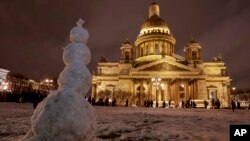The director of a museums' association has urged the patriarch of the Russian Orthodox Church to recall its bid to take control of St. Petersburg's landmark cathedral, a move that has inflamed public passions in Russia.
Several hundred people rallied outside St. Isaac's Cathedral earlier this month. The cathedral is technically a museum, and critics of the plan fear that its transfer from city authorities to the church may inhibit public access. Another protest is set for the weekend despite church officials seeking to assuage protests by vowing that access won't be limited.
The 19th-century neoclassical cathedral is the city's third most-visited site. A regular ticket costs 250 rubles (about $4), and it earned 650 million rubles (nearly $11 million) in 2015, according to its director.
In a letter to Patriarch Kirill late Wednesday, Hermitage Museum Director Mikhail Piotrovsky argued that “peace in people's souls and harmony in society are more important than any assets.” He urged the Russian Orthodox Church to temporarily recall its demand for the cathedral's handover to help assuage the controversy.
Piotrovsky, who also serves as the head of an association of Russian museums, pointed out that the church has regained control over most of the assets it lost after the 1917 Bolshevik Revolution. The few buildings still left in state hands, like St. Isaac, he argued, “have special meaning not only for the church, but the entire multi-faith and multi-ethnic Russian society.”
Kirill's spokesman, Alexander Volkov, responded calmly to Piotrovsky's letter, saying in a statement carried by Russian news wires that the patriarch is ready for a “positive dialogue on the subject with all the interested parties.”
Church services are regularly held in the cathedral. Some museum experts are concerned that its transfer to the Orthodox Church could make it more difficult to visit the site. A specific timeframe for the transfer hasn't been determined yet, but it could happen as early as this year.
The cathedral's transfer has been widely seen as reflection of a growing trend toward social conservatism in Russia. The Russian Orthodox Church has played an active part in President Vladimir Putin's efforts to consolidate Russian society by appealing to traditional values as opposed to Western liberalism.
Alexander Pelin, a spokesman for the Russian Orthodox Church in St. Petersburg, lashed back at Piotrovsky, advising him to focus on the Hermitage and criticizing the museum for hosting a “provocative” exhibition by Belgian artist Jan Fabre. In comments carried Thursday by the Interfax news agency, Pelin argued that the ongoing exhibition was advertising the “cult of death.”
The comment highlighted an increasingly assertive Church's stance about secular affairs, which has worried many in Russia.
Earlier this month, a senior Orthodox cleryman in Siberia lashed out at the local opera and ballet theater for staging the classic Christmas ballet, “The Nutcracker,” which he insisted was based on an “occult subject.”
The same cleric - Tikhon, Metropolitan of Novosibirsk - protested last year against Wagner's opera “Tannhauser.” Several months later the Russian culture minister fired the theater's director and the opera was removed from the theater's repertoire.
Museum Head Defies Russian Orthodox Church Over Cathedral

ST. PETERSBURG, RUSSIA —



